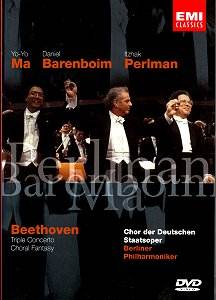What makes the Triple Concerto virtually unique
in Beethoven’s output is that here he forsook monumentalism and attempted
to achieve grace and lightness*. I do not know of any performance ever
by either Toscanini or Klemperer. Hence the Triple Concerto remains
a work to be enjoyed when most of Beethoven has become tiresome through
endless repetition.
When I saw the cover of this DVD I expected it to be
the best performance of the work I’d ever heard, and I wasn’t disappointed.
There were two concerns, however. One is that I’d never seen Itzhak
Perlman live in concert before and the spectacle of this incredible
musician staggering onstage on crutches, painfully adjusting himself
into a chair, and then so carefully laying down his crutches so as not
to annoy anyone with the noise of them banging on the stage left me
with a lump in my throat that didn’t go away until the end of the first
movement. Second, this sound is something that we record collectors
aren’t used to: this is the real thing, full concert hall dynamic range.
Adjust the volume so that the opening applause is just over the threshold
of pain and you’ll have it about right. If you listen through earphones,
be very careful not to adjust the volume for the first notes of the
bass strings, or after the full orchestra comes in you won’t be able
to hear anything at all for a few days. The sound track is in two track
stereo, period. Turn off your surround sound decoder; it won’t add anything
and may detract.
That Perlman and Barenboim have made distinguished—nay,
superlative!—recordings of the Beethoven solo concerti would be expected
to suit them perfectly to collaborate on this work. Yo-Yo Ma has recorded
this work before with Mutter and Zeltzer, and that was a fine recording
also. Yo-Yo Ma has become, in our age, the Liszt, the Paganini of the
cello, even within the memory of musicians of the calibre of Rostropovich.
Beyond this, I must leave off heaping superlatives at the feet of these
magnificent artists whose skill and artistry are so well known.
At first I thought I would have preferred to hear the
soloists more up-front in the sound, but finally realised the balance
is actually perfect. They blend their sound completely with each other
and with the orchestra, emerging just when they should and only as much
as they should. Barenboim discharges his conductorial duties cleanly
while playing his part from memory, and the orchestra plays with emotion
and precision, with tremendous beauty of sound. Tempi are on the fast
side but never sound rushed, even in the wondrous excitement of the
final passages. There is much lyrical beauty in the slow movement and
just the required graceful swing in the finale. In a good performance
of the last movement of this work you should think you hear castanets,
and they were there.
The video image is extremely clear, this being from
a video, not a film, production. We are shown members of the orchestra
playing throughout. We don’t get sparkly lighting effects, out-of-focus
smears, or video clips of birds or flowers or sunsets. One is reminded
that an orchestra consists of a lot of individual players, each with
something going through his or her mind that may at the moment have
little to do with our perception of the music. Some may find this distracting
but that is the way it is. The video director seems to have a crush
on the two pretty girls in the string section, but that’s OK, we have
plenty of good looking guys and ugly old men to look at, too. These
are people earning their living by working very hard. During the 30
years when I was working to earn my modest retirement check as an accountant
and engineer for a local electricity board, I never once at work had
to stop and wipe the sweat out of my eyes, nor was there ever a time
when 5000 people were watching me work, nor did I ever have a television
camera in my face. They deserve to get paid a lot more than I did.
I will still enjoy my previous all-time favourite recording,
a Soviet LP of Oistrakh, Oborin, and Knushevitsky with Golovanov conducting
the Moscow Radio Symphony, telephone quality sound and all. But I won’t
listen to it quite so often now.
If anything can ever convince you that the Choral
Fantasy is a decent piece of music, this performance will. Yes,
we still have those passages near the beginning where Beethoven demonstrates
the astonishing banality of his variation technique. If you or I wrote
that music we’d barely get a C+ from any reputable conservatory. But
things pick up rapidly after that. The singing is extravagantly sensual,
Barenboim’s playing and the orchestra’s response to him are explosively
exciting. When the full chorus comes in any attempt to remain unmoved
will be futile.
I remember we used to talk about something called "brand
loyalty," something that’s considered very, very out of date now.
But one cannot help but notice the consistent high quality of EMI music
videos and it is only good science to observe that somebody there really
knows what he or she is doing. Keep it up, EMI. You’ve earned my vote.
The sound track of this recording is also available
on an EMI CD 7243 5 55516 2 7. But don’t expect that to be as good as
the DVD.
*Another Beethoven work of this nature is the "Spring
Sonata," also for violin.
Paul Shoemaker
